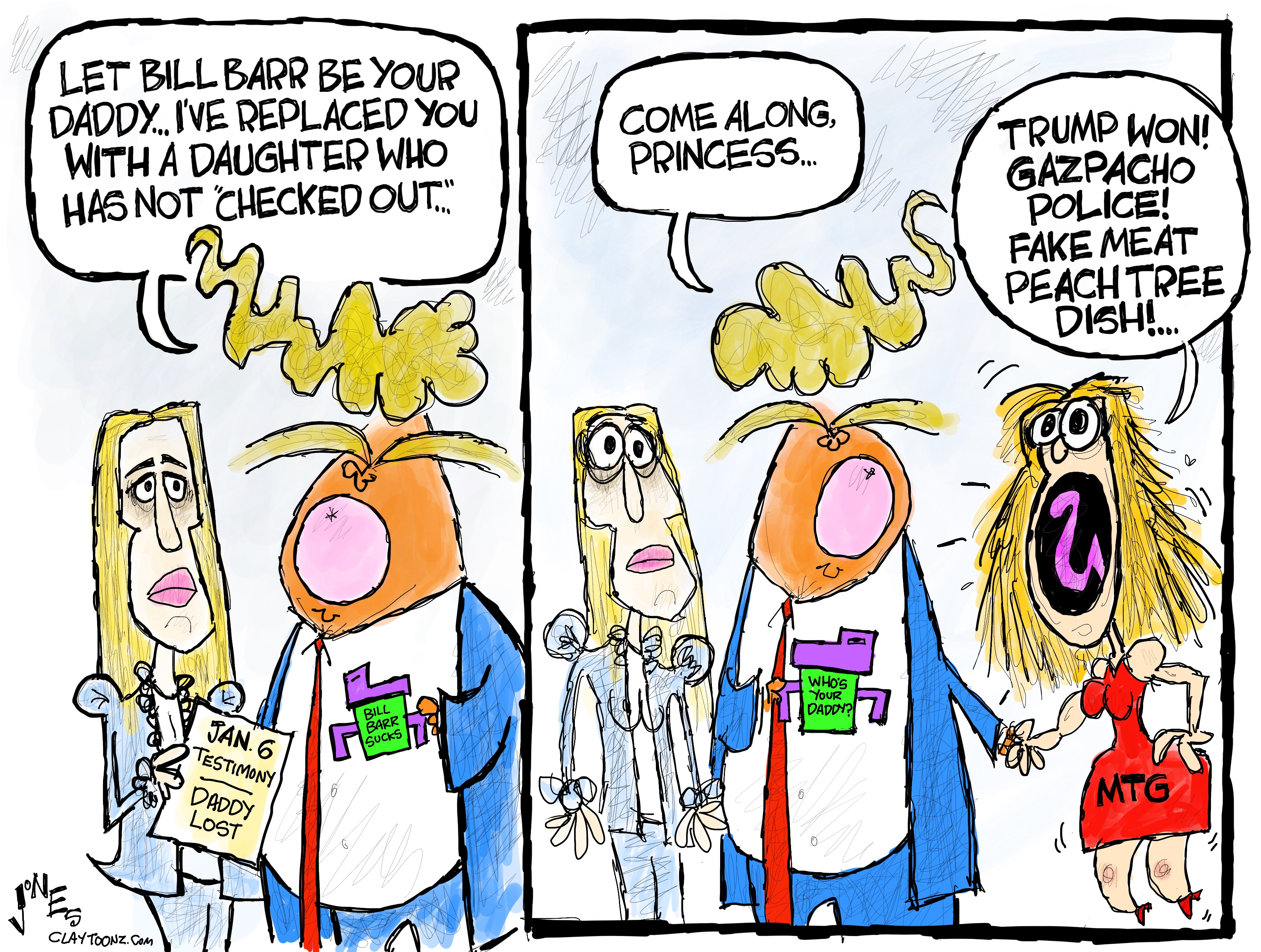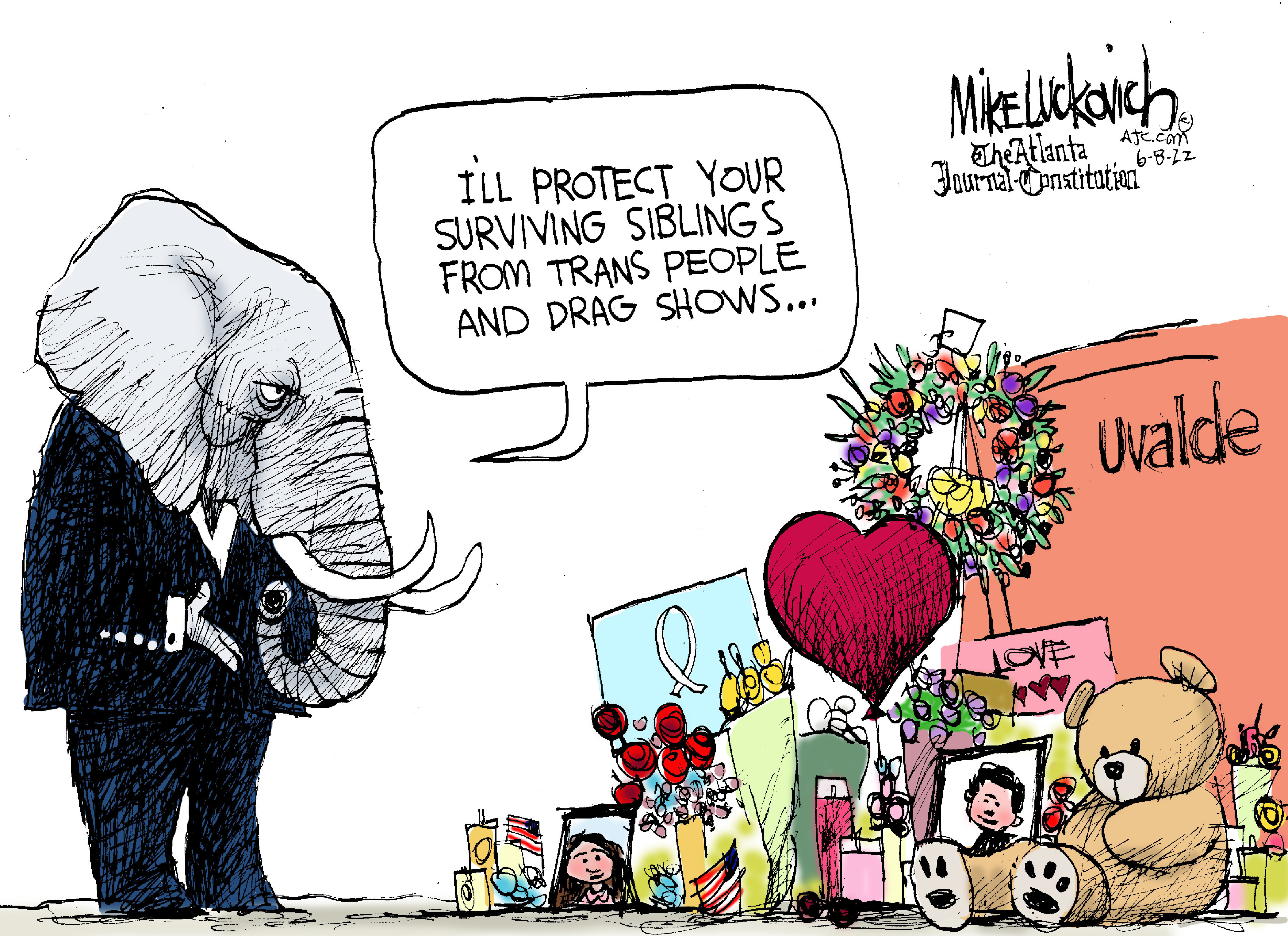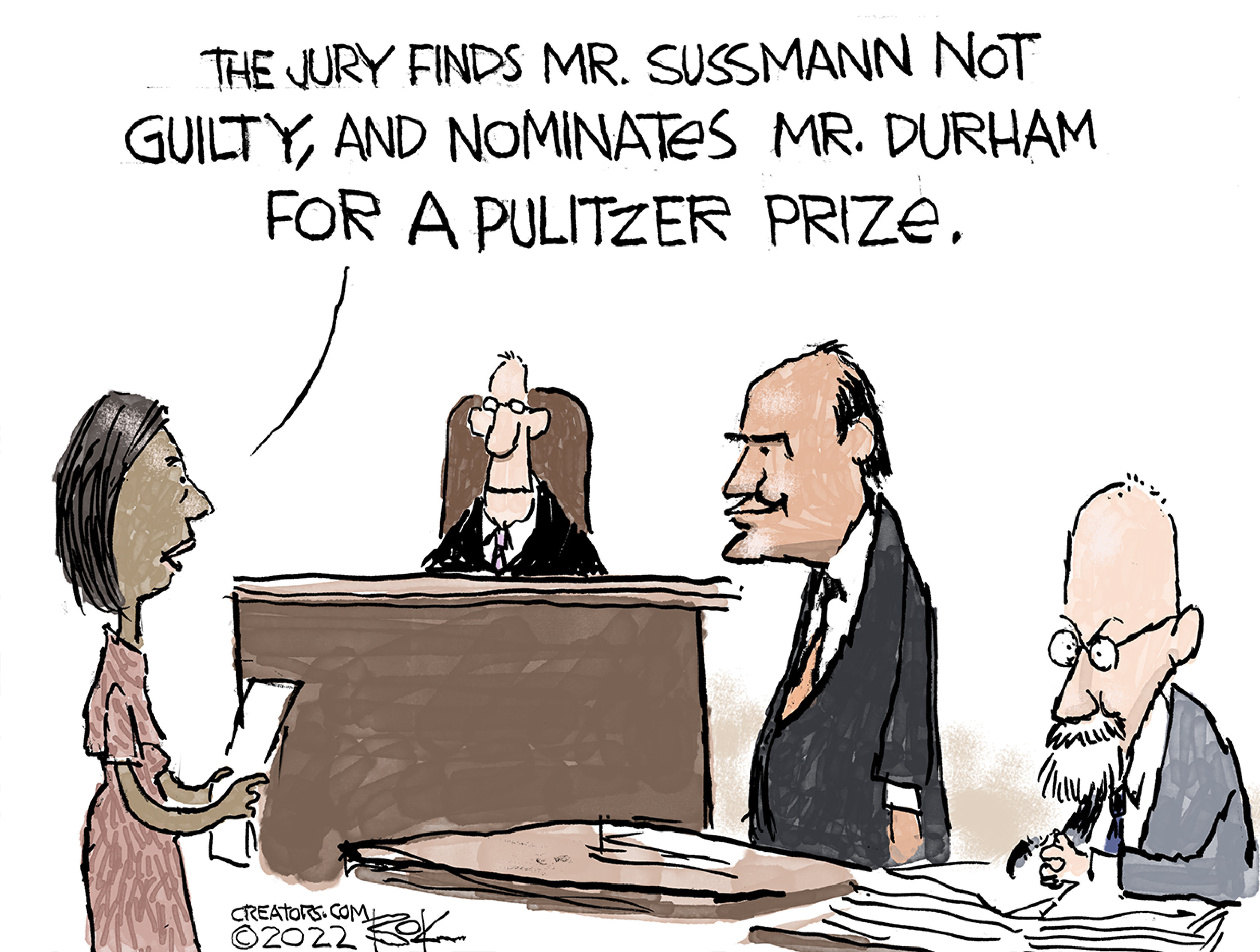The majority has overruled Roe and Casey for one and only one reason: because it has always despised them, and now it has the votes to discard them. The majority thereby substitutes a rule by judges for the rule of law.
- Justices Breyer, Kagan, and Sotomayor
dissent in Dobbs v Jackson Women's Health
This week's featured posts are "Three Supreme Court decisions with long-term consequences" and "The January 6 hearings are accomplishing more than you think."
This week everybody was talking about the Supreme Court
Friday's announcement that the reversal-of-Roe that leaked in May is indeed the decision overshadowed all other developments. But it was not the only radical and consequential thing the Court did this week: It blew a hole in the wall between church and state in Carson v Makin, and it further restricted states' power to control guns in NY State Rifle & Piston v Bruen.
I discuss the opinions themselves in the first featured post. Here I want to consider consequences. All three of these decisions look like the first of many: As sweeping as the Dobbs decision is, it sets up a reconsideration of all rights based on a legal doctrine known as substantive due process (which I explained in March): the right to access contraceptives, to marry a person of the same sex or a different race, and for consenting adults to choose their own sexual practices. Carson will make it difficult to deny government funding to religious organizations in a wide variety of settings. Bruen calls a long list of gun regulations into question.

Planned Parenthood provides an interactive map that allows you to see the current abortion restrictions in any state. Abortion is already illegal in the black states, and severely restricted in the dark red states (many of which will probably ban it entirely before long).
Exactly what illegality means is still being worked out in many states. Mother Jones raises a good question: "If Abortion is Illegal, Will Every Miscarriage Be a Potential Crime?" If it is, who is the criminal -- the woman, or just the doctor? What if the abortion takes place in a different state, where it is legal? My social media is full of people in blue states offering to help women come to their state for abortions. Will they be accessories, who dare not show their faces in Texas or Mississippi for fear of arrest?
What if a miscarriage (or a birth defect) results from negligence rather than intent? Is that manslaughter? As Dana Sussman of National Advocates for Pregnant Women puts it: "You can’t add fetuses to the community of individuals who are entitled to constitutional rights without diminishing the rights of the person carrying that fetus."
The impact this decision will have on the midterm elections, or on all future elections, is hard to gauge. In particular, what happens to educated suburban women, the "soccer moms" who supported Bush and Romney but had trouble stomaching Trump? Will they turn out in force and vote Democratic, or will their generally conservative leanings on economic issues keep them voting Republican?
A brief message to pro-choice women: Make sure the men in your life know how seriously you take the Court's decision, and the new laws that it will inspire.
I say this because my 65 years of male experience have taught me something about how men think. A man, even one who ought to know you better than this, is likely to imagine that losing reproductive rights isn't that big a deal to you because (1) you want to have a child anyway; or (2) you're unlikely to get pregnant; or (3) you're past childbearing age. He may not grasp that you take this assault on your rights personally, or be able to imagine why. But he may listen if you tell him. (If he won't listen, you might want to reconsider his role in your life.)
Susan Collins now feels she was "misled" by Brett Kavanaugh and possibly other justices during their confirmation hearings. Of course, everyone in the world was telling her at the time that she was being a gullible fool, but she still doesn't own up to that. I am reminded of her vote for the Trump tax cut, which Mitch McConnell got in exchange for promises that turned out to be worthless. But Collins dismissed criticism of her gullibility as sexist.
I didn't cover this in the featured post, but a fourth important decision limited the consequences police will face if they don't give suspects a Miranda warning before questioning them.
And just this morning, the Court launched another attack on the separation of church and state by siding with a high school football coach who led prayers at the 50-yard-line after games. The coach is, of course, Christian. No one from any other religion would imagine that he had such a right.
and the continuing revelations of the 1-6 hearings

This week the 1-6 Committee held its fourth [video transcript] and fifth [video transcript] public hearings.
Both were gripping hearings. The fourth hearing centered on Trump's pressure on state and local officials to change the election results. As always, most of the witnesses were Republicans who wanted Trump to win, but wouldn't cheat for him.
Rusty Bowers is the Speaker of the House in Arizona. He testified about how Trump and Rudy Giuliani pressured him to call a special session of the legislature, so that Arizona could decertify its Biden electors. They promised him evidence of massive voter fraud, but never delivered any. Bowers gave an emotional statement about how his Mormon faith teaches that the Constitution is divinely inspired, and that he would never go against the Constitution just "because somebody asked me".
Georgia Secretary of State Brad Raffensperger told the story of the famous phone call where Trump refused to listen to his refutation of Trump's election-fraud claims, and urged him to "find" enough votes for Trump to win the state. His subordinate Gabriel Sterling explained why he publicly warned Trump that "somebody's going to get killed" if he kept pushing his election-fraud deceptions.
But the heart-wrenching moment of the fourth hearing was the testimony of Shaye Moss (supplemented by the taped testimony of her mother), who was a Georgia election worker that Trump targeted falsely as a perpetrator of the "election fraud" that kept him from winning Georgia. Trump had to know, if he bothered to think about it at all, what his followers would do.
Moss testified about the impact Trump's lies had on her life, including telling about a panicked phone call she got from her grandmother:
I received a call from my grandmother. This woman is my everything. I've never even heard her or seen her cry ever in my life. And she called me screaming at the top of her lungs, like, "Shaye, Shaye, oh my gosh, Shaye." Just freaking me out saying that there are people at her home and they, you know, they knocked on the door and of course she opened it seeing who was there, who it was.
And they just started pushing their way through, claiming that they were coming in to make a citizen's arrest. They needed to find me and my mom. They knew we were there. And she was just, like,screaming and didn't know what to do. And I wasn't there. So, you know, I just felt so helpless and so horrible for her.
Both Shaye and her mother (who also was an election worker and also was targeted by Trump) said that they were still afraid to go out in public, and afraid to let anyone know who they are. It was easy to see the signs of depression in her testimony.
I felt horrible. I felt like it was all my fault, like if I would have never decided to be an elections worker, like, I could have — like, anything else, but that's what I decided to do. And now people are lying and spreading rumors and lies and attacking my mom, I'm her only child, going to my grandmother's house.
I'm her only grandchild. And — and my kid is just — I felt so bad. I — I just felt bad for my mom, and I felt horrible for picking this job and being the one that always wants to help and always there, never missing not one election. I just felt like it was — it was my fault for putting my family in this situation.
The President of the United States did this. We've gotten used to Trump falsely and baselessly attacking political rivals or well-known journalists or even non-political celebrities like LeBron James. But this was him picking out an ordinary American who did nothing wrong, and just ruining her life.
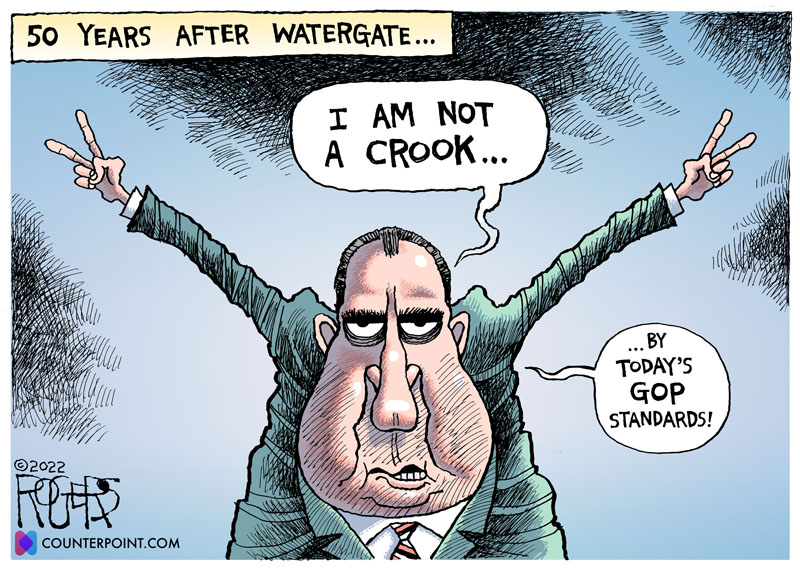
The fifth hearing centered on the Justice Department, and Trump's effort to get DoJ officials to back up election-fraud claims that they had investigated and knew were lies. This effort culminated in a January 3 meeting at the White House, in which Trump proposed replacing Acting Attorney General Jeff Rosen, who wouldn't make false claims on his behalf, with Jeff Clark, who would.
Ultimately it fell apart not because anyone convinced him the scheme was wrong, but because it wouldn't work. The entire DoJ leadership would resign, including Office of Legal Counsel head Steven Engel. Engel warned Trump:
look, all anyone is going to sort of think about when they see this — no one is going to read this letter [that Clark wanted to send to leaders of the Georgia legislature, falsely claiming that the DoJ had found evidence of fraud]
All anyone is going to think is that you went through two attorneys general in two weeks until you found the environmental guy to sign this thing. And so, the story is not going to be that the Department of Justice has found massive corruption that would have changed the result of the election. It's going to be the disaster of Jeff Clark.
Video was shown of the committee asking Clark about these events: He repeatedly pleaded the Fifth and executive privilege (which are contradictory claims; if no crime is involved, the Fifth doesn't apply; if a crime is involved, there's no executive privilege).
And the grand finale of Thursday's session was the list of GOP congresspeople who sought pardons from Trump: Mo Brooks, Matt Gaetz, Andy Biggs, Louie Gohmert, Scott Perry, and Marjorie Taylor Green.
What did they think they had done, that they would need a pardon for?
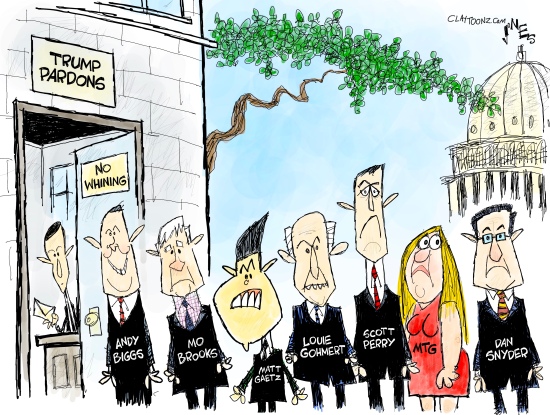
and whether the hearings are changing anything
They're accomplishing more than you think. That's the topic of the second featured post.
and gun legislation
Any other week, this would be a big story. Today, it's hard to find space for it.
Two weeks ago a bipartisan group of senators announced that it had settled on a framework for legislation to do at least something in response to the Uvalde school shooting and the surge of other mass shootings. Last week it looked like the agreement might blow up as they tried to write a bill based on that framework. This week it passed both houses of Congress and is awaiting President Biden's signature.
The bill is simultaneously an accomplishment and a disappointment. Here's what the bill does:
- requires enhanced background checks for young adults 18-21 to buy a gun, and gives authorities ten days (up from three) to perform the checks;
- gives states $750 million in incentives to implement red-flag laws, which temporarily take guns away from people a judge deems dangerous;
- appropriates money for mental health and school safety;
- extends federal law that stops domestic abusers from buying guns, so that it now covers dating partners as well as spouses, live-in partners, and co-parents;
- makes certain kinds of interstate gun trafficking a federal crime.
What it doesn't do is ban assault weapons or high-capacity magazines, establish universal background checks on gun purchases, prevent assault-weapon purchases by young adults 18-21, or enact a federal red-flag law.
As small as these steps are, the bill is the first tightening of gun laws since the Clinton administration. The fact that 15 Republican senators and 14 Republican representatives were willing to vote for it -- in spite of heated opposition from the NRA and some wild attacks from Fox News -- is significant. The next few elections will be tests of the gun lobby's power: If these senators are ousted in Republican primaries by pro-gun challengers, this might be the last federal gun-control legislation for another few decades. If they aren't, the NRA's stranglehold on the GOP might be broken.
and you also might be interested in ...
The pandemic keeps chugging along at the level of about 100K new cases per day. Deaths are increasing slightly, running around 350 per day.
The European Union has formally accepted Ukraine as a candidate to join the Union.
Herschel Walker stories just get weirder and weirder. Somebody found a tape of him claiming his mulitiple personality disorder isn't a mental illness. He offers this interesting theological notion:
Do our Lord Jesus Christ have a mental illness because he said he’s the father, the son and the Holy Spirit? To me, those are 3 different personalities.
I thought I had heard every possible explanation of the Trinity, but that one is new to me. Georgia Republicans must be so proud, particularly the Christian ones.
I don't like to read too much into what are obviously slips of the tongue, because we all have them, and a harsh standard of judgment would hurt everybody. But this is hard to ignore: Appearing with President Trump Saturday in Mendon, Illinois -- not far from where I grew up; the rally was at the county fairgrounds, where I remember seeing a talent show and a tractor pull and eating cotton candy -- Rep. Mary Miller said:
I want to thank you for the historic victory for white life in the Supreme Court yesterday.
Apparently she meant to say "right to life", not "white life". But according to NBC, the crowd -- which had no way of knowing that something different was in her script -- cheered. "Victory for white life" sounded good to them.
and let's close with something musical
Here's proof that anything is musical if you have an ear for it. The Floppotron 3.0 orchestra uses 512 floppy disk drives, 16 hard drives, and four flatbed scanners to play the Imperial March from Star Wars. Somebody had to hear all those noises and imagine what could be done with them.



